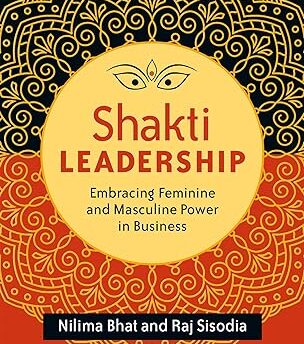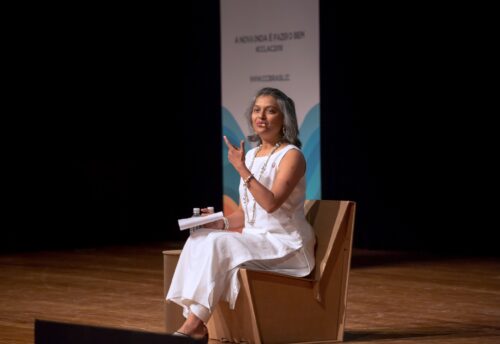“Evolving The Feminine” Lessons In Self- Leadership And Self-Management From Women In The Mahabharatha
This is the textual rendering of a dance-drama presented by Sri Shakti in February 2010 during the occasion of the international conference on Mahabharata and Management at IBA, Bangalore. Performed by Priyadarshini Ghosh Shome, Ranjini Menon and Nilima Bhat
Script by Nilima Bhat
E: Here | W: www.shaktileadership.com
———————————————————————————————
Music: “O Ganga beheti ho kyun?” (by Bhupen Hazarika)
Nilima:
I AM Ganga, the Eternal Flow of Pure Consciousness that permeates through all of Creation.
In the Heavens I AM the Akash Ganga, the Milky Way that spirals forth billions of Stars.
On Earth, I AM the River Ganga who drapes the bosom of Bharat-Mata to nourish and redeem Her children.
Inside every Human, I AM the Antar Ganga, the secret, sacred central axis that goes through their spine to bring balance between Heaven and Earth, Spirit and Matter.
As the impartial witness of TIME since CREATION, I played my Divine role through each of the 18 chapters of Mahabharata, the Great Story of India.
It was coming to the end of the Dvapara Yug. A time of half-Light even if not full blown Age of Kali. And even revered Maharathis had their dark-sides. While the Collective Human Psyche polarised into supremacy of the Patriarchy, the women of the Mahabharata are no less responsible for the Great War that brought about Yugaanth, the end of an Age..
Look closely and The Mahabharata is also the story of the Evolving Feminine.
Take Gandhari.
(Priyadarshini enter..)
Chair with Dhritrashtra as black puppet, Priyadarshini, show shock and anger, disgust/alternate with piety upon seeing that you are married to a blind/inert man.
Go through your drama of also tying a blind-fold on your eyes.
Pick him up and dance him around, stumbling yourself and getting no help from him..
Message clear to audience that instead of one ineffective person (him), you are now two ineffective and therefore dangerous people.
Ganga: Gandhari represents the Unconscious Feminine..The suppressed intuitive, creative, nurturing side that not only blinds us but leaves the Masculine capacities of reason and decisiveness – inert and ineffective. The marriage of the Blind Feminine with an Inert Masculine unleashes destructive forces beyond our control.
Lesson to ponder: As Gandhari blindly emulates Dhritrashtra, are Women in Management too trying to become a ‘Man in a Man’s world’? At what cost?
‘The Feminine’ exists in every man and woman.
I ask you, what capacities have you lost by blinding your Feminine side?
—-
Satyavati performed by Ranjini
Kunti performed by Priyadarshini
‘Thinking women’ are not necessarily ‘Conscious’ women..The game on this Planet seems to be about POWER. And Satyavati thought she could reclaim her power by staking her womb, and its ability to bear a male child.
And my dear Kunti!
She who was so self-less in her service of Durvasa that the great sage gave her a boon to father a child from any of the gods she invoked.
Paradoxically, a woman so empowered by the gods themselves chose to surrender her power to the Men of her age and live within the iron-grip of Patriarchy.
Afraid of what ‘They’ would say, a victim of man-made norms, she abandoned Karna, her first-born, son of Surya himself!
Alas, history has not been kind to Satyavati. She manipulated and traded her Feminity in return for Power and Prestige, resulting in Bhishma’s terrible vow of celibacy. The one event that rippled disaster to many men and women alike…
Satyavati, the ‘thinking woman’ proves as manipulative and power hungry as the ‘thinking man’.
Kunti on the other hand spent all her life dutifully serving the throne of her husband and sought justice for her sons. At every moment of Truth, she gave up her needs and her power to MAN, be he Father, Husband or Sons.
Mistakenly self-surrendering to the Masculine out of Fear, instead of to The Divine, out of Love. Its Victimhood perpetrates the Perpetrator.
Look closely and Satyavati and Kunti are not too different. Both represent the Misdirected Feminine. In their distorted relationship with Power, they are equally polarised and uncentred. The giving up of one’s power is no less dharmic as is the grabbing of power.
What does Satyavati teach you? Is there a Satyavati in you? How do you use or abuse your Feminine Power? ……
What can we learn from Kunti? Never sacrifice out of Fear! Our duty is to choose Love, not Fear.
Have you had a Kunti dilemma…being forced to choose one person over another? What dictated your choice? Fear or Love? ……
And finally, Draupadi!
Emotional, feisty, wilful, fiery daughter of the Earth! As different from me, river-daughter of the Heavens!
Supremely Human, she was all Woman.
(Ranjini, full abhinaya of navarasa)
Yes, Man and Woman are equal, yet the Masculine and Feminine natures within are different!
At his moment of Truth, Arjuna stood on his chariot in the middle of a war-zone (battlefield) and loses his nerve, his mind and turns to the Divine, Lord Krishna, for WISDOM. “Tell me my Dharma! What is the right thing to DO!” he cries.
Draupadi too had her own singular moment of Truth. In a party-hall, in the middle of a war-game! With emasculated husbands on one side and lustful brothers-in-law on the other, she faced the ultimate humiliation.
(Disrobing scene..)
At her moment of Truth, she chose to SURRENDER. Unlike Kunti, not to Men, but to the Divine. Not from Fear, but from total Bhakti..Faith and Love for the Divine. And she achieves a miracle.
While Arjun -the man- sought Wisdom and Understanding from Krishna through his mind, Draupadi – the woman – closed her mind and opened her heart, trusting a Higher Power to intervene and do Justice.
Arjuna had to understand the essence of the Gita. Draupadi LIVED it spontaneously.
Arjuna was given darshan-vision of the totality of the Divine. Draupadi received the grace of direct, Divine intervention.
Our Masculine Mind is very good at understanding and formulating. But it is the Feminine Heart and Body that has been given the capacity of surrender to a Higher Order.
Draupadi represents the Redeemed Feminine in each of us.
As Managers and Leaders today, do you know when to let go and let God?
…..
And so, we return to the beginning to understand the end.
I AM the Antar-ganga within each of you. The central axis that centers, balances and harmonises all dualities, the Kurukshetra within, into a Dharmakshetra.
I represent the Divine Feminine, the Supreme Shakti of Pure Consciousness that flows through and vivifies you. I AM the Great Mother from which your essence has emerged and is sustained and into which it will return.
I AM the bridge across the abyss that connects the Divine to the Human. No one reaches the Lord without Me. So come, surrender your Masculine left-brain, mind, reasoning and strength to Me. Your Sun energy…and I will divinise it! (Surya Namaskar)
Let me flow into your Feminine right-brain, heart, feelings and flexibility. Your Moon energy…and I will perfect it! (Chandra Namaskar)
The Mahabharata started the age of Kali. As we have come full circle and lived through the distortions caused by the fractured psyche, it’s time to become Whole again. The New Age will be birthed not by incomplete men and incomplete women, but by the Whole Man and the Whole Woman, each integrated around their centering axis, sourcing full-spectrum consciousness from their Antar-Ganga! Balanced, Harmonised, Complete! Gifting their Wholeness to each other and the world.
Anchor in Me, with a balanced Mind and an evolved Heart. The Whole Human can lift this Earth up to Heaven and bring down Heaven upon Earth
(Nilima, Priyadarshini and Ranjini chant beej mantras of awakened chakras)
“Om Lam Ma, Om Vam Ma, Om Ram Ma, Om Yam Ma, Om Ham Ma, Om Ksham Ma, Om Sri Ma. Om Sri Ma, Om Ksham Ma, Om Ham Ma, Om Yam Ma, Om Ram Ma, Om Vam Ma, Om Lam Ma, Om Sri Ma” Return to Me anytime through your harmonised breath
(Anulom-Vilom Invite all to join)
Chant after me and know the peace that you are ever whole, complete, purna!
“Om, Purnamadah, purnamidam,
Purnaat, purna mudachyate
Purnasya, purnamaadaaya
Purna mevaavashishyate
That is perfect – this is perfect.
What comes from such perfection truly is perfect.
What remains after perfection from perfection is yet perfect.
Om shanti shanti, shantih.
May there be peace, and perfect peace!
Tathastu. And so it is.


